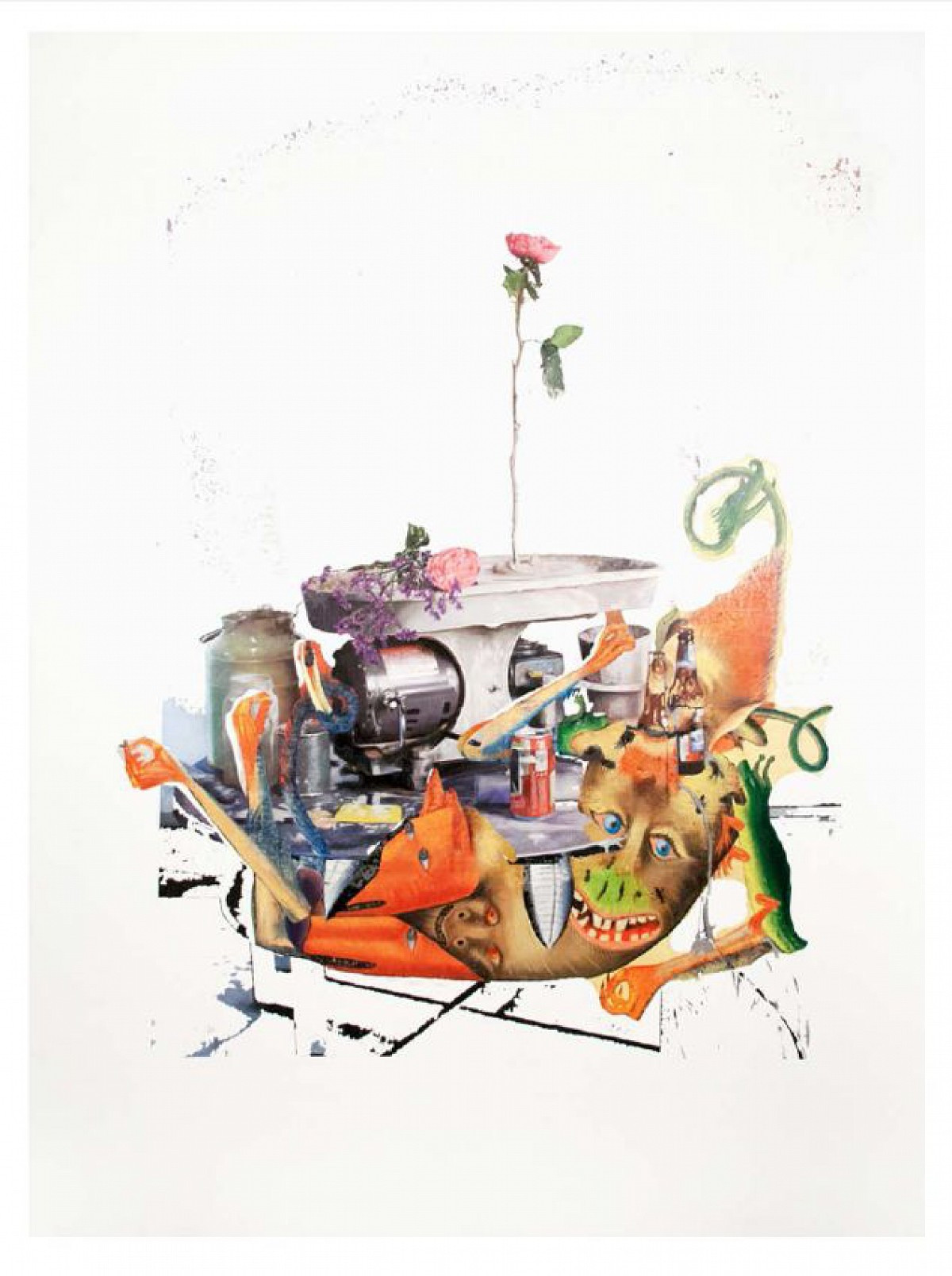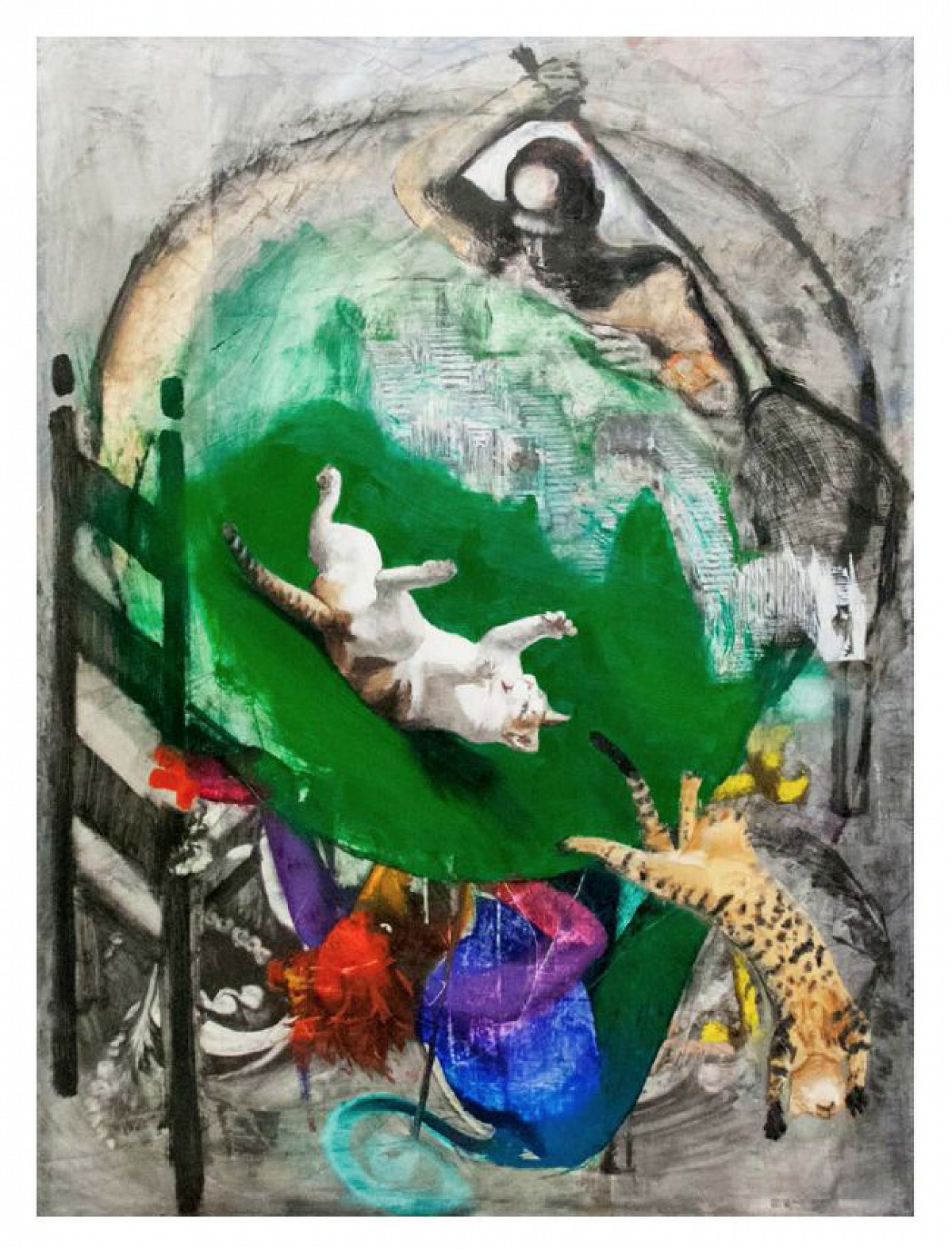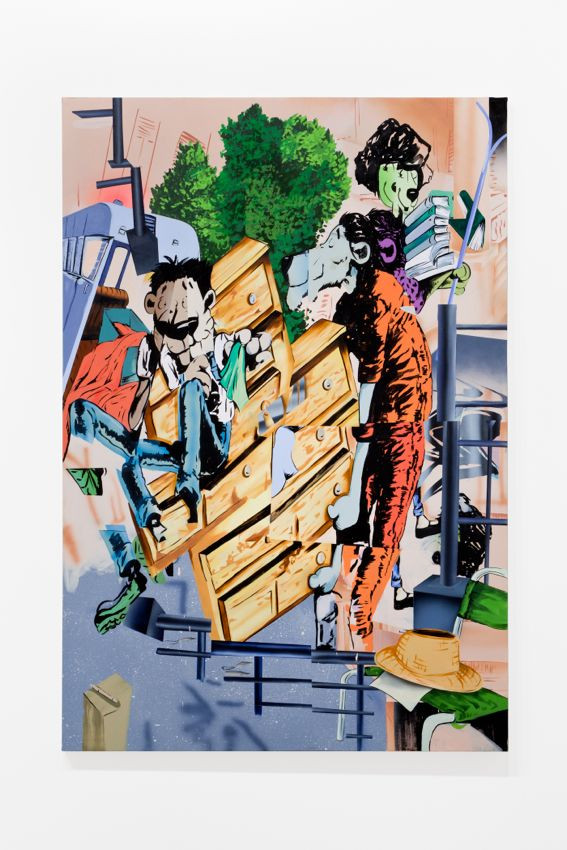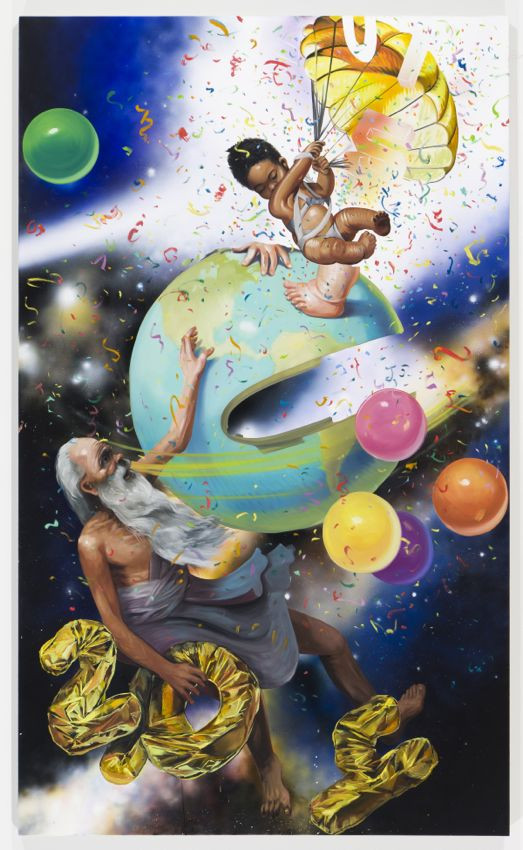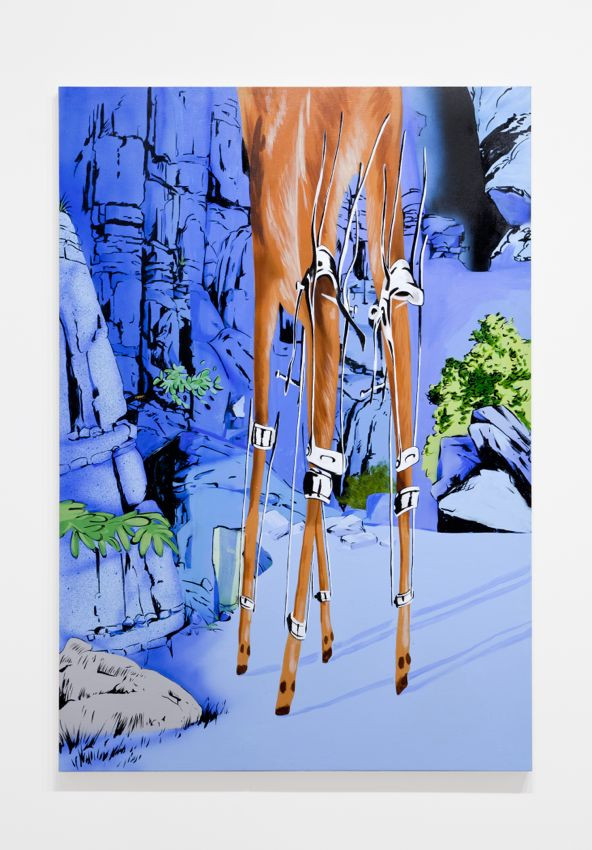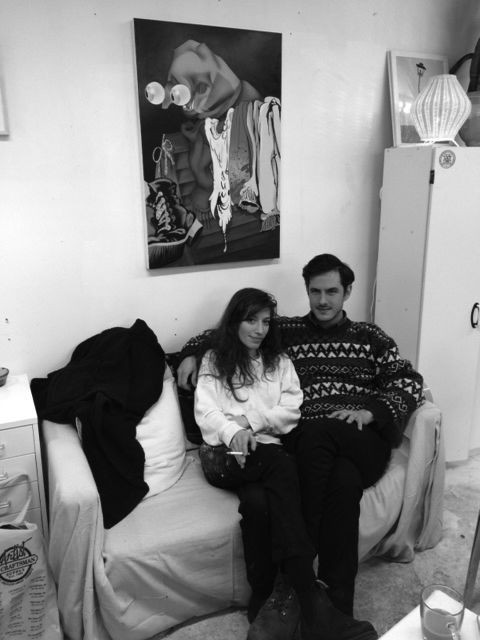Jamian Juliano-Villani & Van Hanos
Published: March, 2015, Zoo Magazine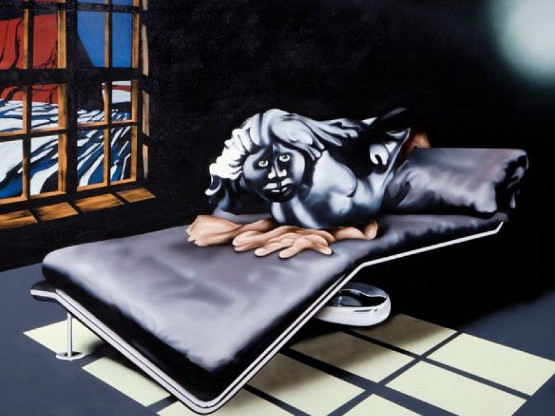
Jackson Pollock and Lee Krasner, Camille Claudel and Rodin, Marina Abramovic and Ulay – the history of art knows artists couples whose passionate relationships stimulated their creativity in an extraordinary way. For the successful New York artists couple Van Hanos and Jamian Julliano-VIllani their experience of life and their polarizing paintings moved into a higher gear after they met.
M: When did you meet?
V: Two summers ago.
J: I came to NY and we met through our friend Joshua Abelow. I did a studio visit with Josh and Van (who shared the studio) was there doing this crazy fucking painting with a lamp light. I left him alone because whatever he was working on looked like some serious shit.
V: I opened the door and we caught eyes. I heard her cursing, she had Timberlands on and I thought: who is this? I had to leave before their visit ended. The next day I asked Josh for her number but Jamian facebooked me first. That night at dinner we put together that she was the artist who made the painting that I loved at Know More Games booth at NADA. Finding out we’re both twin painters was enough for me, but Jamian needed more convincing.
J: He is an incredibly focused motherfucker.
M: You were working as an assistant for other artists at that time?
J: Yes. I was trying to juggle working for Erik Parker, Dana Schutz, Jules de Balincourt among other studio assistant jobs. I wasn’t really a painter before that. I just started learning. At night in my tiny ass bedroom I would stay up and do my own work, then go and paint fifty hours a week for someone else. I thought that no one would ever see them so that’s why they were really rough, slightly embarrassing. It sounds cornball, but I just wanted to express myself.
V: Its a great way to develop and I’m sure helped her breakthrough so fast. She has so much energy, it is so rare to see someone with so much vision, fully developed and without fear.
M: Van, you have been in New York for a quite long time already when Jamian came in.
V: Yeah, we’re both from New Jersey though.
M: You didn’t know each other before?
J: No. I went to the State University in New Jersey, which was like a giant University but not an art school “proper”. I went to Mason Gross School of the Arts within Rutgers, but there were the normal kids doing things like biology, engineering, agricultural studies…and then in the middle of that, were a bunch of art students. I’m glad I went to a public state university because it informed the way I’m looking at art. People that are involved in the arts believe they know what art is supposed to be. After their graduation from an art school they transfer into the art world, i find it sometimes gets pretentious and alienating.
M: Why did you decide to study art?
J: Being a weirdo, I always felt like an artistic person.
V: When they voted in her high school who is most-likely succeed, Jamian was the most likely to end up on Comedy Central.
J: Being artist is one of the rare fields where work and life are intertwined. If you go home, you don’t stop thinking about your work, it doesn’t end. It’s constant. There are no days off because you’re your own boss. No one tells you to stop and no one tells you when to start.
V: But we love to work.
J: Finding the right thing to paint is a struggle.
V: It’s a real challenge.
J: We are making art in a first world country. We can live off of this. You can sell your works for thousands of Dollars. If you go to Indonesia or Nepal they’re making work for cultural value. We make it for cultural capital, which is something different. That is why I think everybody needs to be a little bit more self-aware.
M: You think the society exaggerate the cultural value of the artist?
J: We think of artists in a dramatized version, like I should be wearing a beret during an interview and Van should be holding a palette, but that is not what it is.
V: Even the idea of an interview with us as artists is interesting to analyze. Considering all the facets of the art world: without the work there’s no gallery and there’s no collecting, no history. But at the same time, to assume that we’re doing something that is worth interviewing over is crazy.
M: This is very modest of you to say but we still cultivate the19th century romantic idea of the artist as someone special with extraordinary potentials. Of course we went through post-structuralism and we learned that you have no real agency and are only a part of the structures, but in reality people still think that you replace kind of priests or shamans.
V: That’s something I’ve thought about. Because of Baudelaire’s ideas, we are special. That’s perfect and bullshit at the same time. Still, I quit painting when I learned about Joseph Beuys.
M: Why?
V: Because I saw that painting has no real use. It was the first time I saw what an artist could be. Not a shaman, I wonder if that was in part, lost in translation. But to attempt to heal a society is an amazing thing to try for.
M: In terms of how do you as an artist want to contribute?
V: For a long time I felt guilty to be in this privileged position.
J: We use some bullshit excuses for it. It’s the most self-indulgent thing to do.
V: Still I’m drawn to what Marta said, “artists as priests”. In a way I see it as a secular vocation, that is freeing, but it’s not a normal life.
J: With a big responsibility.
V: It’s a burden in that way. We don’t go out much, don’t party, don’t do all these things that most people enjoy during their youth.
M: If you’re not a priest, not a shaman, not a jester, how do you take this responsibility?
V: Because production of art is one of the unique qualities of human beings, it’s a pre-lingual activity. It’s something that all people should be doing, like meditation. But because most don’t so society needs artists.
J: The only job we have is to express ourselves. It’s not that hard.
M: Artists as catalysts of consciousness of society?
V: Yes. Art is a mirror, or at least a window out of the society. It’s position someone needs to take. If creative acts aren’t a part of everyones necessary lives, then we have to make it a specialized field. In a very simple way, it’s not a huge burden, it’s not like I have to change the world. I just need to do it.
J: It’s not like a huge sacrifice. What else would I be doing?
V: You have a unique position now! You showed up with so much energy and have gotten so much attention. You could say it’s outside of you now. For me, painting in my room for so long without a very limited audience, not thinking about the reason for it is impossible. We’re both extremely lucky.
J: We are lucky and all we have to do is paint.
V: There’s a lot more than that. There is rigor to it.
J: Years of experience, which lead you to a point that you make these decisions in your work
M: Years of experience, Jamian, you are twenty-seven?!
J: I just turned twenty-eight.
V: At the same time Jamian always says: I’m only twenty-eight, give me a break (laughs).
J: But for me it’s a new thing. I can look at it with fresh eyes and take it as it is.
M: What would you consider as a fresh look?
J: Maybe this sounds shitty, but I want my paintings to be personal, complex, psychological; and I also want them to entertain people, which is embarrassing to say.
M: Why?
J: Because painting is supposed to elevate you to another spiritual level and all this blablah bullshit.
M: Which means no metaphysics in your paintings, does it apply to both of you?
V: No, for me there’s a lot. Jamian, you are coming from a different place; you are more in service to the viewer. I really love what you once said: I work hard, I’m doing everything for the viewer so they become passive, like watching TV. As for me, I want the conversation to take place, I want the viewer to come in and do some work and then give it back.
J: People work hard all the time; why should I give them problems? That is why I want them to look and say, hmm, even when it’s just three seconds, let them say, what is that? Oh, it’s so simple! Maybe later they’ll think about the painting and they’ll transfer it into their own experience. When we talk about contemporary painting, it relies so much on the viewer. All this other shit, artists go to school, and have the privileged time to think and talk about art, that is less relevant to me. I had the Verizon guy come over to install internet in my house and he saw what I was working on, he didn’t know shit about painting and we talked about this one piece for twenty minutes. I loved that.
V: Your work does that. It’s part of the images you choose but it’s also a part of the reception. It is a relief to have someone who’s intelligent but not stewed in a graduate speak. Who is popular on Tumblr, while fifteen year old kids want your paintings on their t-shirts, so do museums. That to me speaks volumes of what your paintings are actually doing.
J: It’s funny because many people say to me that I should stay away from that kind of context, because it makes the painting questionable and possibly cheesy. But that means that my work is actually doing what I want it to do. I’m smart enough to know the difference; they like them for the reasons I like them too. I’m not looking for this singular tunnel vision view of what respectable painting is.
V: We have all these high expectations of what our work should do. It should be a painting, it should be art, it should transfer energy from one individual to another. It should carry, in my mind, an experience that has at least a potential to say: other things are possible. I love that about painting. Through a simple craft, which you can compare to plumbing or anything, there is this sort of alchemy that happens through the mud of paint that blows someone’s mind potentially. And that can be my mind.
J: Especially with Van’s work, there’s such a range. He doesn’t care about the last painting he made or the painting from three years ago; instead each painting dictates its own policies. He just does what he wants.
V: There’s also another side to my interest in mimicking and embracing other styles. I made a painting for an album cover. Around that time in particular I was questioning the idea of authorship. All the items I painted: the glasses, the hat, a hoodie, were all directions that my friend, the musician Iron Solomon gave me. I was really excited by being in service of, or collaborating on the content with someone else. In service for a painting that functions in a different way. I would like to ghostwrite. If I were to make a painting for you, under your name in exchange for some special knowledge or another kind of value, that’s a fascinating way to approach painting.
M: What fascinates you so much about it?
V: The idea of being invisible and the way in which the context of my work changes with another person. But also the idea that there’s a unique contract which blurs authorship.
M: This blurring of limit is something you’re interested in?
V: For sure. In that way, ego is stripped, authorship is stripped and any sense of self.
M: Erasing an ego is not easy.
V: That’s my interest. Something that I’ve worked on in a personal way. I’m a twin. There’s a duality in my sense of self. You are always thinking of another side of the individual. On the back of my painting my signature is: Van brother of Patrick Hanos. My brother’s name is Vanguard as a hip-hop musician, which in short is Van for everyone, we share our names.
M: Is this a reaction or a comment to the very egomaniac society?
V: Definitely. But it’s also a healthy approach to life.
M: Hardly possible. The ego is the basic concerns for almost everybody.
V: Sure but then at the same time I don’t think it is a productive side of self. If we’re going to succeed in this life, we have to overcome our egos.
M: Well, a big ego is a great tool for success.
V: I always think of the idea of our power as humans. Maybe the only thing we have in terms of agency is not to consume. We can choose not to consume.
M: Can we really?
V: To say I’m not going to participate is powerful. As a consumer or artist, If I’m using corrupt ways to produce my work, my work is about corruption. A gallery that houses one horrible artists can cloud the vision of an otherwise great gallery.
J: Maybe one horrible artist is funding the rest of the artists so that the interesting things can happen.
V: Sure. But you can make a decision there.
M: You can ask the same question in every single part of our society. It is not whether you are corrupted but to which extend you are corrupt.
V: As soon as Einstein saw the shit coming in 1896 he renounced his German citizenship.
M: Do you think that can be morally clean for 99%?
V: Then I should renounce my citizenship; I don’t agree with American foreign policy, I don’t agree that we have been in an indefinite war. If I would be 100%correct, which I’m not, I wouldn’t be an American anymore. I don’t believe that my money should be going to those missiles.
M: Don’t you think that claiming a-militaristic human world is a bit naive? I wish there were more people like you but I’m afraid that we need protection from ourselves. By putting yourself out of society you’re not going to change it.
V: Absolutely not. That’s the task. You don’t wall yourself in a cloister.
J: Darwin was right. Survival of the fittest is our nature.
M: How do you survive in the art world where there are so many requirements in order to be relevant?
V: When starting out years ago I would have studio visits where people would say, you can paint really well in this way, then you’re exploring this idea, then there are abstract paintings in the room. So when are you going to settle on a style? I said: that’s not going to happen. It’s limiting enough to explore all my ideas through painting.
M: For you there is no such a thing as a style.
V: My music collection reflects a range of interests: a lot of classical music, impressionists, but I was also into death metal, there’s hip hop, weird folk music, tapes from Africa, all kinds of stuff. Saying what kind of music I listen to would be really hard to answer. In terms of me expressing myself; why would I then say, I’m in the art world so I’m only going to project that I really like Ravel, because he is a brilliant composer. It all needs to be there so when it comes out again it’s not a shock and it’s not a disappointment. Not so much to please the other. Kippenberger also said no style is also a style.
M: Why is for you so important not to commit yourself to something specific?
V: Mike Kelley is one of Jamian’s favorite artists and there are also artists I have been fascinated by in that wavelength of potentially insane. if you do the full range of who you are, you won’t be pinned down. Do you really think I’m going to read from the same book for thirty years? There has to be a movement through things.
J: Do what you want.
V: I’m growing and I’m changing too. Looking at Jamian’s work, you can see that she influences me as I think you can see my influence on hers. That is not something to be afraid of or have possession over. There is a matter of respect that you have to navigate through, but of course you have to pick those things up as you travel and it filters into the work. My thought was, painting is an activity that frees the individual and if not having a style means I don’t have a career, then that’s fine. We’re doing it for each other in a large sense, and in a way for ourselves.
M: So you both as artists you want the complete freedom of possibilities.
J: Right.
M: Possibilities of subjects and possibilities of styles, although both of you have a kind of handwriting. Someone like Robert Ryman who is making these white abstract canvases all his life long sounds like a nightmare for you?
J: I would kill myself. Morandi is much more interesting, at least you can drink out of those things.
V: Maybe he did that in his own way, he probably enjoyed it, but this is not for me.
J: I think we both value artists who grow, change and evolve. That’s what good artists do, they are constantly thinking and responding to things. If you’re doing things over again and again, then what are you doing?
M: What about your works as products that circulate in the art market?
J: During Miami Basel I was in a group show in an expensive condo hosted by this incredibly wealthy person. I was at a panel later and someone asked “how do you feel about your painting being in this environment?” I thought that was a stupid question; where the fuck do you think paintings go when you sell them? Half the time, either to a storage rack or a wealthy person’s house. Over-romanticizing artwork that it is something other than a product – is ridiculous. It’s hopeful that work does something other than sell, but it’s also how I make a living, too.
M: Does it matter to you who own your works?
J: In the beginning I sold my works to people who were shady and of course now the works are going to the secondary market. We’re not Pokémon cards but to some people treat artists like tokens that you can just pass by back and forth and that’s the part where you start to feel bitter and used. But it is an interesting thing to think of. When the monetary value comes in it changes the way people think about a work, which is crazy. My prices have changed in the past year and half but the work is the same shit.
V: But Jamian, you are not a common person and you are producing signs of your uniqueness – as much as it sounds cheesy, it is absolutely true.
J; Van helps me so much, otherwise I would be fucked up. Van’s been there; he knows the game. He makes me think about the context of my work, and helps me not to compromise my position.
V: I’ve offered a lot of what I’ve learned to Jamian over the years. She in turn said to me: you are a remarkable young artist right now, but very soon, you won’t be young. It hit me, I got off the bench the next day.
J: Do it now!
V: In a weird way I was telling her what to do but Jamian was like a mirror to me.
J: He made me slow down, I made him speed up.
V: I take more risks now; I trust the moment.
J: I’m being more thoughtful. I’m not good at painting. I wish I could paint like Van. I try, I fail, but I’m growing as a painter because of him.
M: How do people look at you two? You are a part of an artistic community and you are in the meantime a well-known couple in NY.
J: We don’t go out that much.
V: I have never thought that I would be dating a painter. All of our friends are artists, we don’t see any difference there. But we both have been so focused in the studio, its hard to say how others view us. I can see the fire that Jamian has started in NY, it’s clear. I already have a strong community here, so it’s hard to say what the moment looks like.
J: I couldn’t date someone whose work is bad. Van’s work functions in another way than mine. We are different people. I’m inspired by what Van does. We are both twins. We are both used to have someone else there. I’ve never dated a twin before.
M: Do you both have a catholic background?
J: My family got informally “kicked out” of the Catholic church in 1995. My parents are commercial printers, they make promotional souvenirs, T-shirts and that kind of stuff. Robbi Co. is the name of their business (shout out!). Pope John Paul II was visiting the US for the first time in a long time in 1994, my parents were authorized by the church to make and sell papal merchandises with a date on it. The Pope cancelled his visit. The church didn’t pay for it. Robbi Co. had to burn all the t-shirts with the pope’s face on it. He rescheduled and came a year later. The church asked my parents again: do you want to do it, as they owed them tons of money. My parents were really pushing the products, on CNN, in newspapers, promoting bottles of holy water. My father was really having fun with this, making crass jokes about the church on live TV. The Vatican called my parents and left a voicemail saying we were no longer welcome.
M: Hope they made the money back.
J: They did, eventually.
M: What about your relation to money?
J: I had a couple of really rough years but I’m glad it happened. I think that’s why I’m so driven. If I don’t care for myself, no one else will. I’m the only one who can save my own ass.
V: I want our relationship to change that. I’ve been so broke at times that I really had nothing. But I’ve never went hungry; I’ve never needed anything. I can always have dinner at friend’s home. It makes everything so much easier to really know you’re not alone.
J: I came here and I didn’t know anyone.
V: But you are a magnet.
J: I was scared. I didn’t have anybody to talk to. I was working so hard but was not even making rent; I was losing money. Thanks to Van, I could quit my jobs and concentrate on my painting.
V: She had requests for shows, but she didn’t have time to paint.
J: I couldn’t afford to quit working and then Van gave me money.
V: I knew you would be doing great. It turned around tenfold when I was working on the show and Jamian gave me money to get through that. Money is a form of energy. I discovered that two years before I met Jamian when I had an epiphany, which changed my relationship to everything.
M: Was it a kind of meditation?
V: I can’t really explain. It was like a taking a large dose of psychedelics without taking psychedelics. I lost the sense of time, was crying, I needed a new perspective of life.
M: How do you explain this enthusiastic reception of your works at this moment?
J: I am the hardest working person I know.
V: It has to do with a lot of things. A growing interest in figuration and content driven images. The market’s overbearing influence on the natural shifts that follow cultural cue got lagged behind. It adds up and appears to be a lot of new connections being made. It’s an exiting time.
M: do you think that the two of you make a new conversation about art?
J: In the grand scheme of things, hopefully we make a dent. I think that my work in relationship to Van’s seems like polarizing opposites. Our paintings have a strong connection to eachother that I think most people don’t do the math, or put two and two together, so to speak. Van’s work is about his relationship to time, his personal and turbulent relationship with painting, and a connection to life. Mine is about the things I love and realities that don’t exist yet, but ones I would like to fantasize about. The two of those things; Van’s work and my work, when they dance together, is probably a strange thing to witness.
V: I agree, I like the way it looks tho. It may not be a conversation, but neither of us can shut up.
M: Is your work American?
J: My work is very American. I’m American. I think about the underdog of consumer culture, but I also think, “let me maximize this space”. Everything that is American probably came from somewhere else. A dumb example is pizza, but it works. Fashion is a better example. We take from everywhere and conform it to fit in our cultural identity and redistribution. So I’d say my work is aggressively American.
V: I feel a deep affinity with Beuys and others from that generation in Germany. I deeply relate the question their work asks, how do I participate in a culture that I don’t agree with? There is love and hate, its personal and political. For me its rooted in race and class inequalities, growing up without an understanding of where I fit. That voice comes from discovering that I identified outside of my caste. I want legibility but I also want this problem to be accessible.
